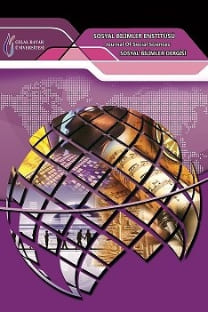Çocuklarda Adalet Bilinci ve Ekonomik Koşulların Adalet Bilinci Üzerine Etkisi
Adalet duygusu büyüme sürecinde çocukların bulunduğu çevreye göre bir noktaya kadar kendiliğinden gelişmektedir. Bu gelişim sürecinde ilköğretim dönemi, çevresel unsurlar ve sosyalleşme ile çocuğun pek çok konuda davranış temellerinin oturduğu bir dönemdir. Bu bağlamda; çalışmanın temel amacı çocuklardaki adalet duygusunun gelişimini ve adaletsizliğe verdikleri tepkiyi gözlemlemek, ekonomik refah düzeyi ve adalet bilinci arasındaki ilişkiyi ortaya koymaktır. Literatür konunun çocukluk çağında nasıl şekillendiği hususunda oldukça sınırlıdır. Çalışmanın sonuçları bu konuda literatüre katkı sağlama açısından önem taşımaktadır. Analiz sonuçlarına göre; ilköğretim çağındaki çocukların adaletsizliğe karşı tepki göstermeleri ile sahip oldukları kardeş sayısı arasında güçlü ancak zıt yönlü bir ilişki vardır. Yani kardeş sayısı arttıkça verilen tepki azalmaktadır. Buna ek olarak ebeveynlerin medeni durumlarının da çocukların verdikleri tepkiler ile ilişkili olduğu görülmüştür. Diğer değişkenler oldukça zayıf ilişki sergilemişlerdir. Dolayısıyla ilköğretim çağındaki çocukların adaletsizliğe verdikleri tepkilerin, ekonomik koşullardan değil içinde büyüdükleri sosyal ortamdan etkilendiği sonucuna ulaşılmıştır.
Anahtar Kelimeler:
adalet, adalet bilinci, ekonomi
Justice Awareness in Children and the Effect of Economic Conditions on Justice Consciousness
The sense of justice is developing to a point spontaneously in this growth process according to the environment of the children. The primary education period in this development process is a period of the foundation of the behavior of child’s in many issues with environmental factors and socialization. The literature is very limited as to how the subject took shape in childhood. Although there are studies on the subject, studies on how the subject is shaped in childhood are quite limited. The results of this study are important in terms of contributing to the literature. According to the analysis results, there is a strong but opposite relationship between showing reaction to the injustice and the number of siblings they have. In other words, as the number of siblings increases, their action decreases. In addition, it was observed that the marital status of the parents was also related to the actions of the children. Other variables showed a very weak relationship. Therefore, it has been concluded that the reactions of primary school children to injustice are not affected by economic conditions but by the social environment in which they grow up.
Keywords:
Justice, Economy, Economic Conditions,
___
- Benenson, J.F., Pascoe, J. and Radmore. N. (2007). Children’s Alturistic Behaviour in the Dictator Game. Evulation and Human Behavior, 28(3), 168-175.
- Blake, P.R. & Rand, D.G. (2010). Currency value moderates equity preference among young children. Evolution and Human Behavior, 31(3), 210-218.
- Blake, P.R., McAuliffe, K.(2011). ‘‘I had so much it didn’t seem fair’’: Eight-year-olds reject two forms of inequity. Cognition. 120(2), 215-224.
- Campbell, T. (1988). Justice. Edt: Jones, P., Weale, A. Macmillan Education.
- Çeçen, A. (2020). Adalet Kavramı. 5.Basım, Ankara, Astana Yayınları.
- ISSN: 1304-4796
- Yayın Aralığı: Yılda 4 Sayı
- Başlangıç: 2003
- Yayıncı: Manisa Celal Bayar Üniversitesi
Sayıdaki Diğer Makaleler
Türkçe Sözlüklere Göre “Salgın” Kavram Alanı
Finansal Gelişmenin Vergi Gelirleri Üzerine Etkisi: Geçiş Ekonomileri Örneği
Dokuzuncu Hariciye Koğuşu ve Mrs Dalloway Romanlarında Bilinç Akışı ve İç Monolog Teknikleri
Türkçe Öğretmeni Adaylarının Dijital Yazmayla İle İlgili Görüşlerinin İncelenmesi
Kompulsif Satın Alma Davranışı Üzerinde Bedavanın Gücü
Üniversite Öğrencilerinin Mezuniyet Sonrası Kariyer Beklentileri: Ayvacık Meslek Yüksekokulu Örneği
